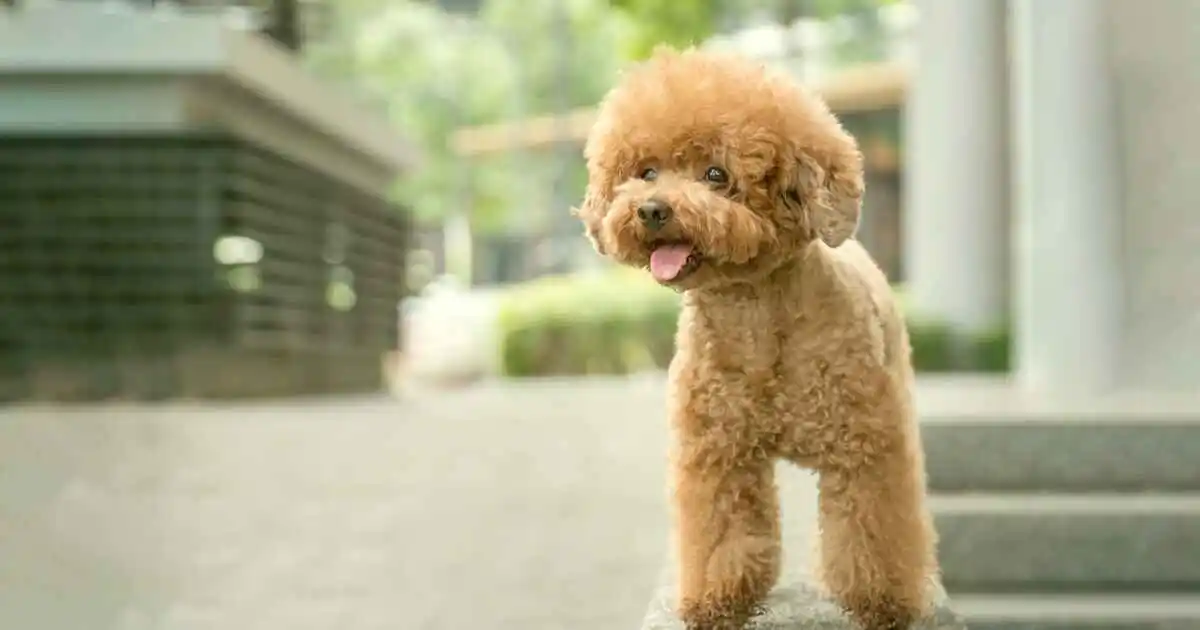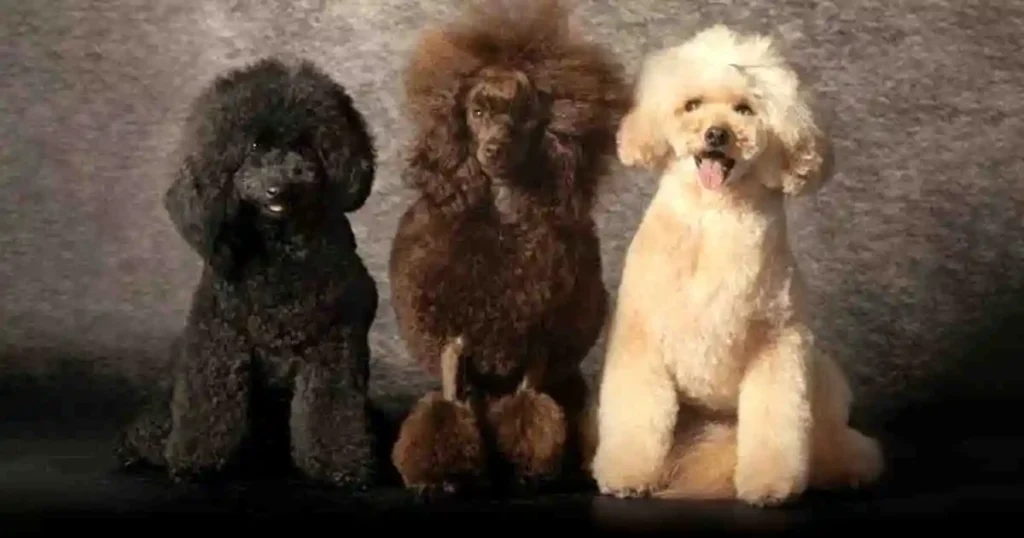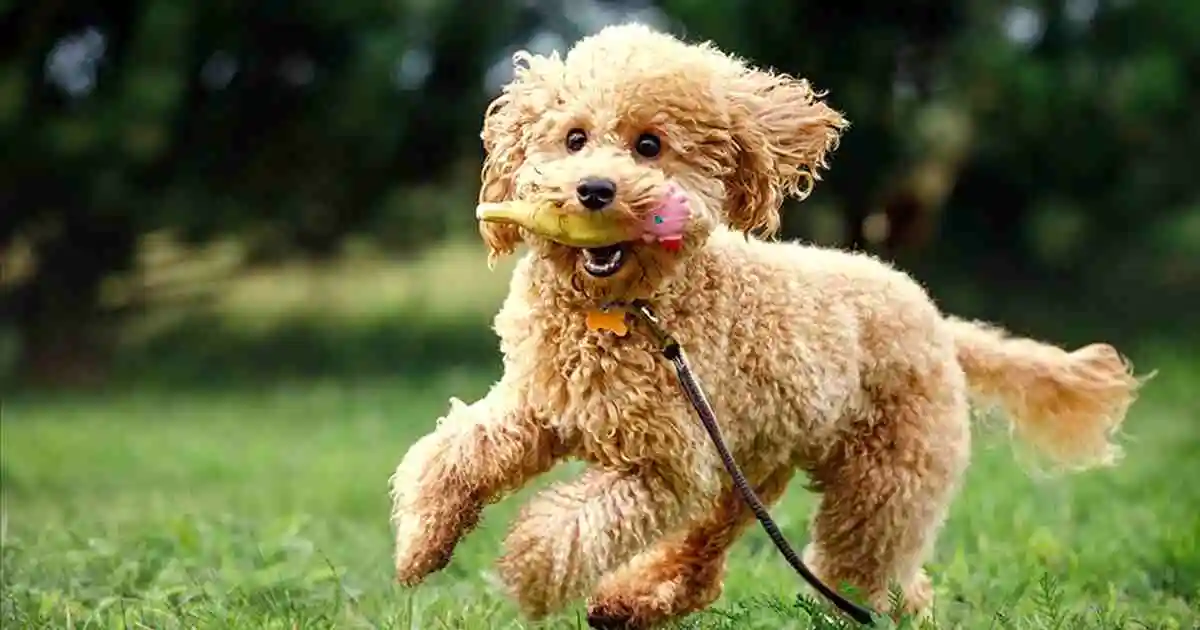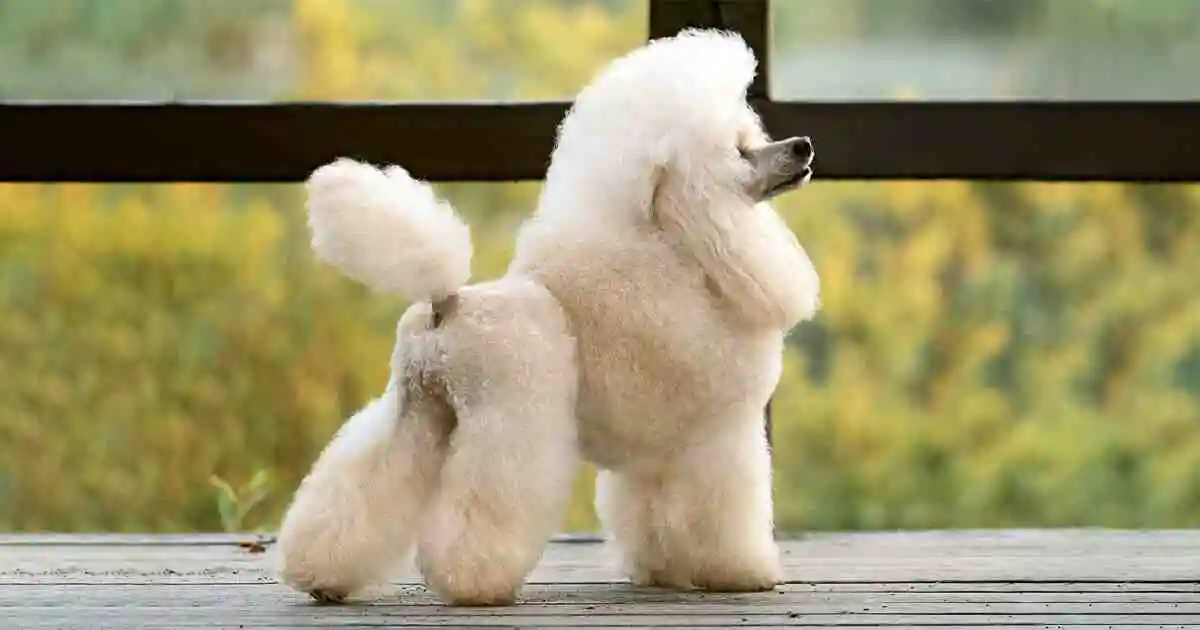Miniature Poodles are small, energetic, and intelligent dogs that make wonderful companions for various households. They typically weigh 10-15 pounds and stand 10-15 inches tall when fully grown. While they shed infrequently, they are not hypoallergenic, but their low-shedding coat can be suitable for some allergy sufferers.
Miniature Poodles require regular exercise, mental stimulation, and grooming, with their coat needing professional grooming every four to six weeks. These dogs are known for their friendly and playful nature, getting along well with other pets and children. Training is essential for Miniature Poodles to keep them mentally engaged, and they excel in obedience and agility competitions. Additionally, they are good watchdogs, tend to be reserved with strangers, and are peaceful with other animals.
Table of Contents
ToggleMiniature Poodles have a lifespan of 10-18 years and need companionship throughout the day to prevent loneliness and potential behavioral issues.
The Charming Miniature Poodle
The miniature poodle, celebrated for its intelligence and stylish appearance, is a beloved pet among dog lovers. This breed is not only friendly and affectionate but also highly trainable, making it a great companion for various activities like agility and obedience training.
As part of the Mini Doodles group, miniature poodles are often bred with other small breeds to create delightful, low-shedding hybrids. Their adaptable nature and hypoallergenic coat make them an excellent choice for families and allergy sufferers alike, thriving in both large homes and cozy apartments.
Temperament and Personality
Miniature Poodles are known for their intelligent and trainable nature. They are quick learners who respond well to positive reinforcement and are eager to please their owners. This breed requires mental stimulation to stay happy and can enjoy activities such as fetching named toys or playing hide and seek.
Their alertness makes them excellent watchdogs, as they will bark to alert their owners of someone at the door. Despite their vigilance, most Miniature Poodles are polite and non-aggressive with strangers, with some being exceptionally friendly and viewing every new person as a potential friend. They also tend to get along well with other dogs and cats, making them great additions to households with existing pets.
Physical Characteristics
Miniature Poodles come in two different builds: the correct “square” build, where the dog’s height is approximately equal to their length, and a build with shorter legs and a longer back due to chondrodysplasia, a physical deformity. The square-built Miniature Poodles are both elegant and athletic, moving with a light, springy gait that is a pleasure to watch.
Mini Goldendoodles are a cross between a Miniature Poodle and a Golden Retriever, or a Miniature Poodle and a Goldendoodle. They are a smaller version of the standard Goldendoodle, typically standing 13-20 inches tall and weighing 15-35 pounds

This build contributes to their agility and ability in sports such as obedience and agility competitions. Regardless of the build, Miniature Poodles possess a curly, hypoallergenic coat that is light-shedding, making them a good choice for people with allergies.
Athleticism and Activity Needs
Despite their small size, Miniature Poodles are miniature athletes. They excel in advanced obedience and agility competitions, showcasing their retrieving and jumping skills. These activities not only provide physical exercise but also mental stimulation, which is crucial for the breed’s happiness.
Miniature Poodles enjoy a variety of activities, including swimming, which is excellent exercise for them. They thrive on being active and require daily exercise to match their high energy levels.
Grooming Requirements
Contrary to popular belief, Miniature Poodles can be clipped to look like normal dogs, avoiding the elaborate show-ring clips. Regular grooming every six weeks, including bathing and clipping, can maintain their coat in a manageable condition. This grooming routine helps keep their coat healthy and the dog looking neat.
Health Considerations
Miniature Poodles are generally healthy, but like all breeds, they are prone to certain health conditions. Responsible breeders test for common health issues such as hip dysplasia, eye disorders, and more. Two orthopedic problems, Legg-Calve-Perthes and luxating patellas, are more likely to occur in Miniature Poodles than in Standard Poodles. Awareness and regular health screenings can help manage these conditions.
In conclusion, Miniature Poodles are versatile, intelligent, and affectionate dogs that make wonderful companions. Their need for mental and physical exercise, combined with their hypoallergenic coat and trainable nature, makes them suitable for a wide range of owners. Whether participating in agility sports or simply enjoying a game of fetch with their family, Miniature Poodles are sure to bring joy and activity to any home.
History and Origin
Tracing the lineage of the Mini Poodle reveals a fascinating journey through history, beginning with its earliest ancestors and evolving into the beloved breed known today. This section delves into the origins, transformations, and key historical milestones of the Mini Poodle.
The Earliest Ancestors
- The barbet, a curly-coated dog found across Europe, is considered the earliest version of the poodle. Originating from countries such as France, Russia, Hungary, and Germany, the barbet likely descended from Asian herding and water dogs.
- Transitioning from the barbet, the German variant evolved into the breed recognized today as the poodle.
From “Pfudel” to Poodle
- The term “poodle” is derived from the German word “pfudel,” meaning “puddle” or “to splash.” This name references the breed’s proficiency as a water retriever, highlighting its historical role in retrieving game from water.
- Poodles have served in various capacities beyond water retrieval, including roles as circus performers, military dogs, guard dogs, and guide dogs.
The Evolution of Grooming
- The distinctive poodle haircut originated as a practical solution for retrieving in cold waters. By cropping the hair close to reduce weight and drag while leaving it longer on the head and chest for warmth, the poodle was better equipped for its tasks.
- Over time, this functional clip evolved, particularly as poodles became popular circus performers. The style became more decorative, emphasizing the breed’s elegance and agility.
The Rise of the Miniature Poodle
- The French aristocracy’s fascination with the poodle led to the breeding of smaller versions. By the late 1800s, the miniature poodle was perfected in France, despite the breed’s German origins.
- The American Kennel Club (AKC) recognized the poodle in 1887, later categorizing the breed into three size varieties, including the miniature poodle.
The Poodle’s Global Journey
- While most psychologists agree on the poodle’s German origins as a water dog, some believe it originated in France, known as the “Caniche,” descending from the barbet.
- Historical depictions and breed names in both German and French point to the poodle’s ancestors being widely used by waterfowlers for retrieving game and lost arrows.
The Standard Poodle and Its Miniature Counterpart
- The standard poodle, known for its water retrieving capabilities, served as the original blueprint for the breed. The desire for a smaller version led to the creation of the miniature poodle.
- Initially referred to as the toy poodle until 1907, the miniature poodle was distinguished from even smaller breeds by its size, ranging from 11-15 inches.
Through this exploration of the Mini Poodle’s history and origins, it becomes clear that this breed has been shaped by its utility, adaptability, and the changing preferences of its human companions. From its early days as a water retriever to its modern status as a beloved pet and show dog, the Mini Poodle’s journey is a testament to its enduring appeal and versatility.
Physical Characteristics
Miniature Poodles exhibit a blend of elegance and athleticism, standing about 10–15 inches tall and typically weighing between 10–15 pounds. Their athletic, muscly bodies reflect their origins as water retrieval dogs, designed for both agility and strength.
These dogs possess curly coats that are not only hypoallergenic but also minimal in shedding, making them an ideal choice for individuals with allergies. The variety in coat colors, including black, white, apricot, grey, silver, and brown, adds to their appeal, allowing potential owners to choose a dog that matches their aesthetic preferences.
Athletic Build and Size
Miniature Poodles have a compact and well-proportioned body that contributes to their distinguished appearance and regal stance. Their size ranges from 10 to 15 inches at the shoulder, weighing in at a manageable 10-15 pounds. This size makes them versatile pets, suitable for various living situations, from apartments to larger homes with yards. For a detailed comparison of sizes, including those of Mini Goldendoodles, refer to the Mini Goldendoodle Size Chart.
Coat Type and Grooming Needs
The breed’s coat is dense, curly, and comes in a wide range of colors. Regular grooming is essential to maintain their coat’s health and appearance. A slicker brush or a comb designed for curly coats is recommended for thorough brushing, which should be done two to three times a week to prevent mats and tangles. Professional grooming every 4-6 weeks is also advised to keep their coats trimmed and neat.

Athleticism and Activity Level
Despite their small size, Miniature Poodles are energetic and require daily exercise to stay healthy and happy. Their athleticism shines in activities such as swimming, retrieving, and agility sports, highlighting their need for both physical and mental stimulation.
Unique Physical Traits
Miniature Poodles are characterized by their lively faces, dark eyes, and the option for various haircuts. While the show ring may favor the elaborate continental clip, most pet owners opt for the simpler sporting clip, which is a short, one-length cut that maintains the outline of their squarely built, smoothly muscled body without the fuss of curling pom-poms.
Summary of Key Physical Characteristics
| Characteristic | Detail |
| Height | 10–15 inches |
| Weight | 10–15 pounds |
| Body Type | Athletic, Muscly |
| Coat Type | Curly, Hypoallergenic |
| Coat Colors | Black, White, Apricot, Grey, Silver, Brown |
| Grooming Needs | High; regular brushing and professional grooming |
| Activity Level | High; requires daily exercise |
Miniature Poodles stand proudly among dogdom’s true aristocrats, beneath their curly, hypoallergenic coats lies an elegant athlete and companion for all reasons and seasons. Whether participating in agility sports or enjoying a leisurely walk, these dogs are adaptable, intelligent, and sociable, making them an excellent addition to any family.
Personality and Temperament
Miniature Poodles are celebrated for their delightful and engaging personalities, which make them not only excellent companions but also versatile in various activities and settings. Their intelligence, eagerness to please, and friendly temperament are traits that stand out, making them a favored breed among many dog enthusiasts.
Intelligence and Trainability
- Known for their high intelligence, Miniature Poodles respond well to training, often excelling in obedience and agility competitions.
- Their alertness and quick learning abilities allow them to master complex commands and tricks, showcasing their capability to think and respond rapidly.
- This breed thrives on mental stimulation, enjoying games that challenge their intellect, such as fetching named toys or participating in hide and seek.
Sociability
- Miniature Poodles possess a friendly and pleasant nature, easily getting along with people of all ages.
- They have a keen sense of humor and an air of playfulness, engaging in antics that are sure to entertain.
- Despite their vigilance as watchdogs, alerting their owners to someone at the door, they are generally polite and non-aggressive towards strangers.
- Their peaceful demeanor extends to other dogs and cats, making them suitable for multi-pet households.
Sensitivity and Emotional Needs
- These dogs are soft-tempered and may exhibit hypersensitivity to unexpected touches or loud sounds, indicating their need for a gentle approach.
- They prefer environments that are peaceful and harmonious, as too much activity or conflict can cause them emotional distress.
- Some lines of Miniature Poodles can be high-strung and nervous, emphasizing the importance of careful breeding, socialization, and training to ensure a well-adjusted dog.
Athleticism and Playfulness
- Miniature Poodles are miniature athletes, demonstrating strength and grace in agility competitions and advanced obedience contests.
- Their playful nature and need for exercise make them great companions for children, requiring ample playtime to keep both their bodies and minds active.
- Early socialization and training are crucial for building confidence and preventing anxiety in new situations.
Adaptability
- Miniature Poodles are adaptable to various living conditions, thanks to their moderate temperament and manageable size.
- They carry themselves with confidence and dignity, often unaware of their small stature, which adds to their charm as companion dogs.
- While they can be the center of attention within the home, their intelligence and loyalty make them steadfastly loyal to their families.
| Trait | Characteristic |
| Intelligence | High, quick learners |
| Trainability | Excellent, responsive to commands |
| Sociability | Friendly, gets along with people and pets |
| Sensitivity | Prefers peaceful environments, can be hypersensitive |
| Athleticism | Energetic, requires daily exercise |
| Playfulness | Engages in fun-loving antics, enjoys playtime |
| Adaptability | Confident and adaptable to various settings |
In summary, Miniature Poodles offer a blend of intelligence, sociability, and athleticism wrapped in a dignified and affectionate package. Their ability to adapt to different family dynamics and environments, combined with their playful and loving nature, makes them an ideal choice for many dog lovers looking for a versatile and engaging companion.
Training and Exercise Needs
Training and exercise are crucial components in the life of a Mini Poodle, impacting their physical, behavioral, and social health significantly. This section delves into the essentials of training and exercise for Mini Poodles, providing a comprehensive guide to meet their needs effectively.

Grooming as Part of Development
Grooming plays a pivotal role in the development of Mini Poodles, starting from an early age. It is not merely about maintaining their appearance but also about acclimatizing them to the grooming process, which is an integral part of their routine.
- Early Start: Breeders often begin grooming practices, such as trimming the face, around four to six weeks of age. Nail trimming can start as early as three days old to prevent the puppies from scratching their mother during nursing.
- Acclimatization: Introducing grooming early on helps Mini Poodles get accustomed to being handled and groomed. This involves starting with simple steps, like clipping the face, and gradually moving to clipping the feet and tail.
- Hygiene and Aesthetics: Regular grooming is essential for hygiene, given that Mini Poodles do not shed. Their hair would grow indefinitely without grooming, leading to potential matting if not properly maintained. Grooming also serves an aesthetic purpose, with many owners preferring certain styles for their Poodle’s tail and feet.
Training: Beyond Basic Commands
Training a Mini Poodle goes beyond teaching basic commands; it involves understanding what truly motivates them and ensuring they respect their owner’s guidance.
- Motivation and Respect: While treats can be effective motivators, it’s crucial that Mini Poodles obey commands out of respect, not just for a treat. This ensures the owner remains in control.
- Respect Training: Employing “Respect Training” methods is recommended for Mini Poodles. A dog that respects its owner will heed commands and cease undesired actions when instructed.
- Teaching Specific Words: Training involves teaching specific words in ways that encourage both understanding and respect. This ensures the dog not only comprehends the commands but is also eager to follow them.
Exercise: A Pillar of Health
Regular exercise is paramount for Mini Poodles, influencing their physical well-being, behavior, and social skills.
- Physical Health Benefits: Regular exercise boosts blood circulation, strengthens muscles, aids digestion, and can prevent various health issues, including diabetes and stroke. It also plays a critical role in managing a healthy weight and maintaining muscle tone.
- Behavioral Benefits: Adhering to an exercise routine can significantly improve a Mini Poodle’s behavior, reducing aggression, destructiveness, and attention-seeking behaviors. It promotes better sleep patterns and overall mood.
- Socialization: Exercise is not just about physical health; it also enhances a Mini Poodle’s social skills. Regular walks and playtime with other dogs or humans foster socialization, strengthening the bond between the dog and its owner.
Exercise Guidelines by Age Group
Different age groups of Mini Poodles have varying exercise needs, from puppies to seniors.
- Puppies: Exercise should be carefully scheduled for puppies to avoid overexertion, which could harm their development.
- Adults: An adult Mini Poodle requires around 60 minutes of exercise daily, ideally divided into two or three shorter sessions.
- Seniors: Senior Mini Poodles still benefit from regular, light exercise to maintain muscle mass, relieve joint discomfort, and enjoy the general health benefits of staying active.
Overcoming Exercise Challenges
Owners might face challenges in maintaining a regular exercise routine for their Mini Poodles due to various factors, such as weather conditions or the dog’s behavior during walks.
Alternative Activities: When outdoor walks are not feasible, alternative activities like playing fetch indoors, using a kiddie pool, or engaging in hide-and-seek can provide valuable exercise and mental stimulation.
By understanding and implementing these training and exercise needs, owners can ensure their Mini Poodles lead a healthy, well-behaved, and fulfilling life.
Grooming and Maintenance
Grooming and maintenance are essential aspects of caring for a Mini Poodle, ensuring their coat remains healthy, beautiful, and free of mats. This section provides a detailed guide on grooming practices, from selecting the right tools to maintaining the coat and skin health of your Mini Poodle.
Essential Grooming Tools
To properly groom a Mini Poodle, certain tools are necessary for the task. Here’s a list of the items you should have:
- Clippers: A reliable pair of clippers is crucial. Ensure you have a 10-blade for general use and a 5F or 7F blade for a closer trim.
- Cool Lube: Use Cool Lube to clean, lubricate, and cool the clipper blades as per the label’s instructions.
- Shears or Scissors: For detailed trimming around the poodle’s face, feet, and tail.
- Brush and Pin Comb: Essential for detangling and keeping the coat neat.
Understanding the Poodle’s Coat
The coat of a Mini Poodle is unique and requires specific care:
- Mini Poodles have a single-layer coat of curly hair that grows continuously.
- Puppies have soft, wavy hair that transitions to adult hair between 9 to 18 months, reaching full maturity around three years.
- Regular combing is necessary to prevent mats and tangles, as loose hair tends to get caught in the curls.
Grooming Frequency
Regular grooming sessions are vital for maintaining the health and appearance of your Mini Poodle’s coat:
- Professional Grooming: Schedule a session every three to six weeks, depending on your dog’s coat condition.
- Bathing: Mini Poodles should be bathed every four to six weeks, with thorough brushing before each bath to ensure the best results.
Selecting the Right Shampoo and Conditioner
Choosing the appropriate grooming products is crucial for the health of your Mini Poodle’s coat and skin:
- Shampoo: Opt for a shampoo specifically formulated for poodles or sensitive skin, considering your dog’s coat color for any specific needs.
- Conditioner: A high-quality conditioner should include mink oil for shine and anti-static agents to prevent flyaways. Look for products with PABA UV sunscreen for additional protection against the sun.
Additional Grooming Tips
Incorporating these grooming practices will help maintain your Mini Poodle’s coat health:
- Use of Finishing Sprays: These products contain components that enhance shine, reduce tangles, and offer UV protection without leaving the coat oily.
- Regular Brushing: Establish a daily brushing routine using a slicker brush followed by a bristle brush to remove tangles and smooth the coat.
- Eye and Ear Care: Clean around the eyes to prevent tear staining and keep the ears dry and clean to avoid infections.
| Grooming Task | Tool(s) Needed | Frequency |
| Clipping | Clippers, Cool Lube | Every 3-6 weeks |
| Bathing | Shampoo, Conditioner | Every 4-6 weeks |
| Brushing | Slicker brush, Bristle brush | Daily |
| Ear and Eye Cleaning | Damp cloth, Ear cleaning solution | As needed |
By adhering to this comprehensive grooming guide, owners can ensure their Mini Poodle not only looks their best but also enjoys a healthy and comfortable life. Regular grooming is not just about aesthetics; it’s a crucial component of your Mini Poodle’s overall well-being.
Health Issues and Lifespan
Miniature Poodles, while known for their intelligence and charming personalities, are predisposed to certain health issues that prospective and current owners should be aware of. Understanding these conditions and the typical lifespan of a Miniature Poodle can help owners provide the best care for their furry friends.
Common Health Issues in Miniature Poodles
- Mitral Valve Disease: Affecting Miniature Poodles over 8 years old, this heart condition involves a leaking valve, leading to heart enlargement and potentially congestive heart failure.
- Addison’s Disease: This condition occurs when the adrenal glands fail to produce enough corticosteroid hormones, affecting the dog’s metabolism and stress management. It can result in serious health issues or even be fatal.
- Dyschondroplasia: A hereditary skeletal disorder that results in underdeveloped limbs, causing symptoms like lameness, limping, and difficulty moving.
- Legg-Calve-Perthes Disease: Young Miniature Poodles may suffer from this condition, where the head of the femur breaks down, causing pain and limping. Surgical correction is often required.
- Hypothyroidism: Symptoms include obesity, excessive hunger, lethargy, and chronic ear and skin infections, resulting from insufficient thyroid hormone production.
- Luxating Patella: A common issue where the kneecap slips out of place, affecting small dogs including Miniature Poodles.
- Eye Conditions: Miniature Poodles can develop progressive retinal atrophy (PRA) leading to blindness, and cataracts, which can be surgically corrected.
Lifespan and Care
- Miniature Poodles have a life expectancy of 12 to 15 years, which can extend to 14–16 years with proper care. Factors influencing their lifespan include genetics, health, diet, exercise, and quality of care.
- Regular veterinary check-ups, a balanced diet, and daily exercise are crucial for extending a Miniature Poodle’s life.
- Dental hygiene plays a significant role in their overall health, with small breeds like Miniature Poodles being more prone to periodontal disease.
Table: Health Issues and Lifespan Summary
| Health Condition | Symptoms/Effects | Management/Treatment |
| Mitral Valve Disease | Heart enlargement, potential heart failure | Medication, monitoring |
| Addison’s Disease | Metabolic issues, stress management problems | Hormonal supplements |
| Dyschondroplasia | Lameness, limping, difficulty moving | Supportive care, pain management |
| Legg-Calve-Perthes Disease | Pain, limping | Pain medication, surgery |
| Hypothyroidism | Obesity, lethargy, skin infections | Hormonal supplements |
| Luxating Patella | Kneecap displacement | Medication, surgery |
| Eye Conditions (PRA, Cataracts) | Blindness, navigation difficulties | Monitoring, surgery (for cataracts) |
| Lifespan | 12-15 years, up to 14-16 with optimal care | Regular veterinary care, balanced diet, exercise, dental care |
Owners can help their Miniature Poodles lead a healthy and fulfilling life by being attentive to their health needs and ensuring they receive regular veterinary care. With the right support, these delightful dogs can enjoy a long and happy life as part of the family.
Conclusion
Through the comprehensive exploration of mini poodle care, we’ve delved into the heart and soul of what makes these charming companions truly special. From their distinctive athleticism and intelligence to their sociable and adaptable nature, mini poodles prove to be more than just lovable pets but integral members of the families they join.
Emphasizing their need for mental stimulation, regular exercise, and detailed grooming, the guide underscores the commitment required to ensure these dogs lead healthy, happy lives. Additionally, understanding potential health concerns and their implications plays a crucial role in providing a nurturing environment for mini poodles to thrive.
FAQs
To properly care for Miniature Poodles, it’s important to meet their moderate exercise requirements daily through walks or play sessions. These activities help keep them physically fit and mentally sharp, preventing boredom and associated destructive behaviors like chewing, digging, or scratching.
Miniature Poodles generally have a lifespan of 10 to 18 years. Despite their small size, they are energetic and require substantial exercise. Their popularity is also boosted by their low-shedding coats, making them appealing to those concerned with cleanliness.
Miniature Poodles need about 1 to 2 hours of exercise each day to satisfy their moderate to high energy levels. They enjoy a variety of activities, including brisk walks, jogs, playing fetch, and engaging in dog sports such as agility and obedience training.
Miniature Poodles are particularly sensitive to stress, which can lead to digestive issues and neurotic behaviors if there is tension in the home. These dogs flourish in a calm and stable environment, highlighting the need for a peaceful and harmonious household.



